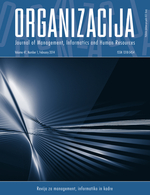Uvodnik
Povzetek
The aim of this special issue “Recent Advances in Simulation based decision making in business process” is to continue presenting the research achievement from the area of Systems Approach and Decision Support Systems for assessments of complex problems. The majority of the contributions represents extended and revised papers presented at the 26th, Conference on System Research, Informatics and Cybernetics, Baden-Baden, Germany, August 4-9, 2014, in the stream Simulation Based Decision Support and Business Intelligence, chaired by Miroljub Kljajić. The special issue includes papers dealing with the development of simulation methodology, modeling tools and practice for decision assessment, service systems, control, optimization and agriculture dynamics research. To address those issues above, firm policies need to be established as a result of continued search for a sustainable future.
In that respect, the paper entitled “Sugar beet production: A system dynamics model and economic analysis” describes the system dynamics model for beet production development in order to support decision making and is continuation of previous research. The sugar beet is the main field crop used for sugar production in the temperate climatic zone. Since investment in sugar beet industry are long term and ireversible the decision support and economic analysis are required in order to maximise investment returns. A system dynamics methodology was chosen to model the impacts of regional sugar factory investments. The simulation provides answers to strategic questions related to the total sugar beet production and processing system and will be used for the simulation of different scenarios for sugar production and their impact on economic and environmental parameters at an aggregate level.
The purpose of the paper entitled “How Close to Reality is the „as-is” Business Process Simulation Model?” was the development of a Business Process Simulation (BPS) model based on real-life data. The research has been performed in Polish Telecommunications Company. The authors investigate technical process of expanding cellular network. After elaborating “as-is” model, authors use ADONIS simulation tool to run a series simulations and confront simulation results with actual historical events. The simulation model has been constructed with data from the WfMS database, observations, staff knowledge and their experience. The authors conclude that BPS is not a popular approach for process reengineering and improvement yet. Data collection issues for BPS that require adopting process mining techniques and additional information sources are among the reasons for that.
The paper entitled “Web Application for Hierarchical Organizational Structure Optimization – Human Resource Management Case Study” describes new methodology to prevent oscillation during optimization of parameters in organizational hierarchical structure. The objective was optimization of the flow parameter values in the hierarchical organizational model with genetic algorithms and finite automata. The hierarchical structure was modeled according to System Dynamics. The problem of the undesired oscillatory behavior was addressed with deterministic finite automata, while the flow parameter values were optimized with genetic algorithms. The results indicate that the hierarchical organizational model, genetic algorithms and deterministic finite automata have been successfully implemented with JavaScript as a web application that can be used on mobile devices.
The aim of this paper entitled “Systems Approach to Standardisation, Classification and Modelling of Managed Events for Tourism” is the development standardisation and classification of managed events provides a legislative basis to distinguish events managed for tourism in their characteristics and quality. In the context of a systems approach, the authors used qualitative modelling and constructed causal loop models of the legislative system of events and investments in the events. Article was continued with structure of SD model in a frame of systems dynamics.
In the paper “A Statistical Model for Shutdowns due to Air Quality Control for a Copper Production Decision Support System”, a decision support system for copper production for one of the largest mining companies in Australia was developed. Statistical model for shutdowns due to air quality control and some of the data analysis conducted during the simulation project was described. The statistical model made use of a full year of data on daily downtimes and used a combination of techniques to generate replications of the data. The environmental conditions affected greatly the operations of the production facility. A good statistical model was essential for the successful simulation and the high budget expansion decision that ensued.
The last paper of this issue is called “Multi-criteria assessment of vegetable production business alternatives”. The article describes oorganic and integrated production of vegetables in Slovenia. The study analyzed two production systems with different cultures as alternatives with the purpose to find the most appropriate variants. The study is based on the development and integration of developed specific technological-economic simulation models for the production of vegetables (growing salad, peppers, salad cucumbers, pickling cucumbers, round and cherry tomato) in greenhouse and multi-criteria decision analysis. The methodology of the study based on the DEX methodology and the analytical hierarchy process (AHP) of organic (ECO) and integrated production (IP) in greenhouse. The evaluation results show that both cultivation methods of commercially attractive vegetables in greenhouse are variable.
The guest editors hope that our selected topics display the state-of-the-art of the research efforts over the world coping with complex problem solving in a holistic way which is characteristic for modern Systems Research and Cybernetics! Moreover, we are very thankful to journal Organizacija (Organization - Journal of Management, Information Systems and Human Resources) for having given us the opportunity and honour of hosting this special issue as a scientific project and service to the people on earth. We express our gratitude to the Editors of Organizacija, and hope that our special issue will well-demonstrate Organizacija being a premium journal and of a great scientific and social value!

